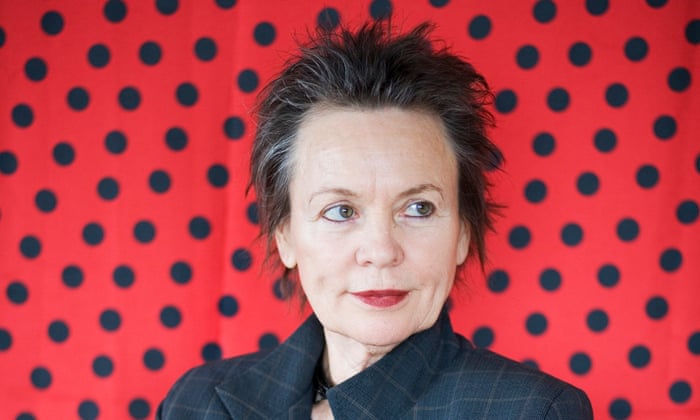The Guardian has published an interesting interview with Laurie Anderson; in partial below, the full piece here.
Hello Laurie! Your movie about your terrier, Lolabelle – her piano-playing and painting, her blindness and her death (1) – is moving audiences to tears at Telluride (2). Is it hard showing it?
Yes. It’s really personal and I don’t have the defences. These are stories I would do in a live show. But then I wouldn’t have to sit in the audience. I went on a long tour a few years ago and the repeated use of the word “I” made me almost lose my mind. I ended up truly hating myself.
You’re asking people to come up and tell you what they think of it.
Comments after, I really do enjoy. It’s not about the film. It’s someone saying something about themselves to me. This is great! I’m an anthropologist. We have our own lives to live and we gather information from other sources about how to do it. Everybody wants to find a little love, you know? And a little bit of power and knowledge. It’s really hard to learn that stuff. In the US, parenting doesn’t practically exist. (3) The guidance is just: “Well, things are a lot more difficult for you than for me. So good luck and see ya!”
There’s a lot in the film about the Tibetan Book of the Dead and how it advocates not crying while you grieve.
I didn’t realise really until this festival that there’s more death in this film than any car-crash movie. Everyone dies! What I love about the Tibetans is their focus on the main event: this person’s death. And trying to understand it without self-pity. The Buddhist point of view is also a journalistic one: to see things as they are. I appreciated the no-crying thing because I’m puritanical and filled with guilt and doubt. Lucky me! If you recognise death as a huge event primarily in someone else’s life, it becomes much more awesome. I felt very lucky to have that realisation.
Why is it people never quite seem prepared for it?
It’s scary, is why. Depending on your belief system you’re either erased or you’re wearing some sort of strange crown.
In the movie you show Lolabelle’s realisation she can be preyed on from above by eagles. Have people in the western world lost sight of that kind of threat? Do we think we’re invincible?
I never thought of it like that. Most of the people I know are not like that. Their invisibility is such a thing crushed. It’s usually just masking a whole lot of fear.
Isn’t it one of the problems about climate change? On some level people just won’t believe it?
Isn’t that ignorance not invincibility? It’s irritating, the TED-talk mentality of: “I’m going to fix the world with tech.” Their little microphones and chinos and powerpoint presentations and “Don’t worry, we’ll all be robots by then! It’ll be fantastic!” No, we won’t. We won’t be robots. And then you realise it’s strange how often you have to buy into the green movement by purchasing something. You realise they all have stuff to sell.
I just saw Danny Boyle discuss his Steve Jobs movie (4). He wanted to talk about the psychological influence of Jobs on the world. But everyone just wanted to hear about the casting or the products.
I’ve seen that a lot. The central problem is never mentioned. Ever. It’s taboo. It’s about the disappearance of American liberals. There really aren’t that many.
